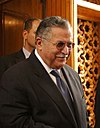Iraq is a federal parliamentary representative democratic republic. It is a multi-party system whereby the executive power is exercised by the Prime Minister of the Council of Ministers as the head of government, the President of Iraq as the head of state, and legislative power is vested in the Council of Representatives.
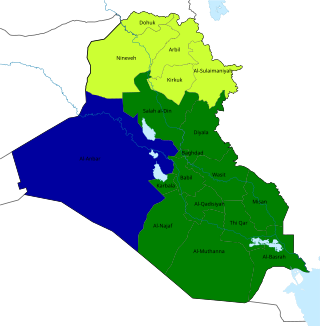
Parliamentary elections were held in Iraq on 30 January 2005 to elect the new National Assembly, alongside governorate elections and a parliamentary election in Kurdistan Region. The 275-member legislature had been created under the Transitional Law during the international occupation. The newly elected body was given a mandate to write a new constitution and exercise legislative functions until the new constitution came into effect. The elections also led to the formation of the Iraqi Transitional Government.

The Council of Representatives, usually referred to simply as the Parliament, is the unicameral legislature of the Republic of Iraq. According to the Constitution of Iraq, it is the lower house of the bicameral legislature of the country. As of 2020, it comprises 329 seats and meets in Baghdad inside the Green Zone.
The Kurdistan Region parliamentary elections of 2005 for the parliament of the Kurdistan Region, were held on 30 January 2005, to coincide with the January 2005 Iraqi parliamentary election and elections to the governorate councils. It was the first parliamentary election to be held in Kurdistan Region since 1992.

On 19 May 1992 elections were held to the Kurdistan National Assembly, the parliament of the Kurdistan Region in Iraq. At the time, the National Assembly had 105 seats, of which 5 were reserved for the Assyrian community. Parties had to achieve more than 7% of the vote to be elected. There were 178 polling stations around the region.
Kurdistan Islamic Union, colloquially referred to as Yekgirtû, is a Kurdish Islamist party in Iraqi Kurdistan.
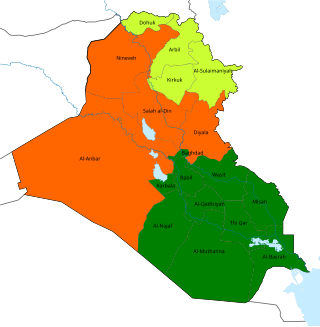
Parliamentary elections were held in Iraq on 15 December 2005, following the approval of a new constitution in a referendum of 15 October.

The Bet-Nahrain Democratic Party, usually abbreviated as BNDP is an Assyrian political party in Iraq led by Romeo Nissan Hakkari. One of the party's goals is to create an autonomous Assyrian Administrative Region within the Assyrian homeland.
The first government of Iraq led by Prime Minister Nouri al-Maliki took office on May 20, 2006 following approval by the members of the Iraqi National Assembly. This followed the general election in December 2005. The government succeeded the Iraqi Transitional Government which had continued in office in a caretaker capacity until the new government was formed and confirmed.

The Parliament of Kurdistan, also called the Kurdish Parliament (IKP), is the parliament of the Kurdistan Region in Iraq. It is made up of representatives from the various parties, lists or slates that are elected every four years by the inhabitants of the provinces of Kurdistan Region currently governed by the Kurdistan Regional Government. In 2009 an amendment was applied to the Kurdistan Election Law of the year 1992, and since then the body was referred to as Kurdish Parliament instead of its previous name the Kurdish National Assembly.

Parliamentary elections were held in Iraq on 7 March 2010. The elections decided the 325 members of the Council of Representatives who would elect the prime minister and president. The elections resulted in a partial victory for the Iraqi National Movement, led by former Interim Prime Minister Ayad Allawi, which won 91 seats, making it the largest alliance in the Council. The State of Law Coalition, led by incumbent Prime Minister Nouri Al-Maliki, was the second largest grouping with 89 seats.
The Al Anbar Governorate election of 2009 was held on 31 January 2009 alongside elections for all other governorates outside Iraqi Kurdistan and Kirkuk.

The Nineveh Governorate election of 2009 was held on 31 January 2009 alongside elections for all other governorates outside Iraqi Kurdistan and Kirkuk Governorate.

Assyrian politics in Iraq have been taking many different turns since the US invasion of Iraq in 2003. Today, there are many different Assyrian political parties in Iraq. The main Assyrian party that came out from the 2005 elections was the Assyrian Democratic Movement. However, Sarkis Aghajan began to challenge its power beginning in 2006 with the opening of Ishtar TV and the KDP-affiliated Chaldean Syriac Assyrian Popular Council.
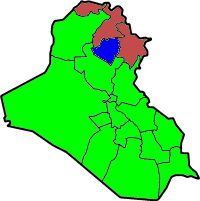
Governorate or provincial elections are due to be held in Arbil Governorate in 2009 to replace the governorate council elected in the Iraqi governorate elections of 2005. The remaining governorates outside Iraqi Kurdistan held elections on 31 January 2009. The election will follow the 2009 Iraqi Kurdistan legislative election.

Governorate or provincial elections are due to be held in Dahuk Governorate in 2009 to replace the governorate council elected in the Iraqi governorate elections of 2005. The remaining governorates outside Iraqi Kurdistan held elections on 31 January 2009. The election will follow the 2009 Iraqi Kurdistan legislative election.

Governorate or provincial elections are due to be held in Sulaymaniya Governorate in 2009 to replace the governorate council elected in the Iraqi governorate elections of 2005. The remaining governorates outside Iraqi Kurdistan held elections on 31 January 2009. The election will follow the 2009 Iraqi Kurdistan legislative election.
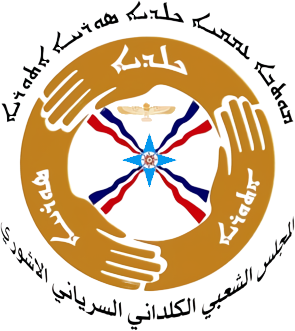
The Chaldean Syriac Assyrian Popular Council, popularly known as Motwa, is a political party in Iraq, that was founded in 2007, on the initiative of Sarkis Aghajan, a high-ranking member of the Kurdistan Democratic Party. As a party that represents minority communities, CSAPC participated in several elections, both on national, regional and local levels, mainly in various coalitions with other minority parties. The current president of the party is Jameel Zaito.

Governorate or provincial elections were scheduled to be held in Iraq on 20 April 2020, to replace the provincial councils in the governorates of Iraq that were elected in the 2013 Iraqi governorate elections and, in Kurdistan Region, in the 2014 elections. The elections were delayed indefinitely in November 2019, amidst demonstrations demanding the end of the existing political system.

The Legislative Council of the Autonomous Kurdistan Region was a legislative body for the Kurdistan Autonomous Region in northern Iraq consisting of Duhok Governorate, Erbil Governorate and Sulaymaniyah Governorate from 1974–2003. This regional assembly had limited powers to legislate on issues relating to health, education, labour and social, cultural and economic development. It was based in Erbil. Members of the Legislative Council served in three-year periods.


